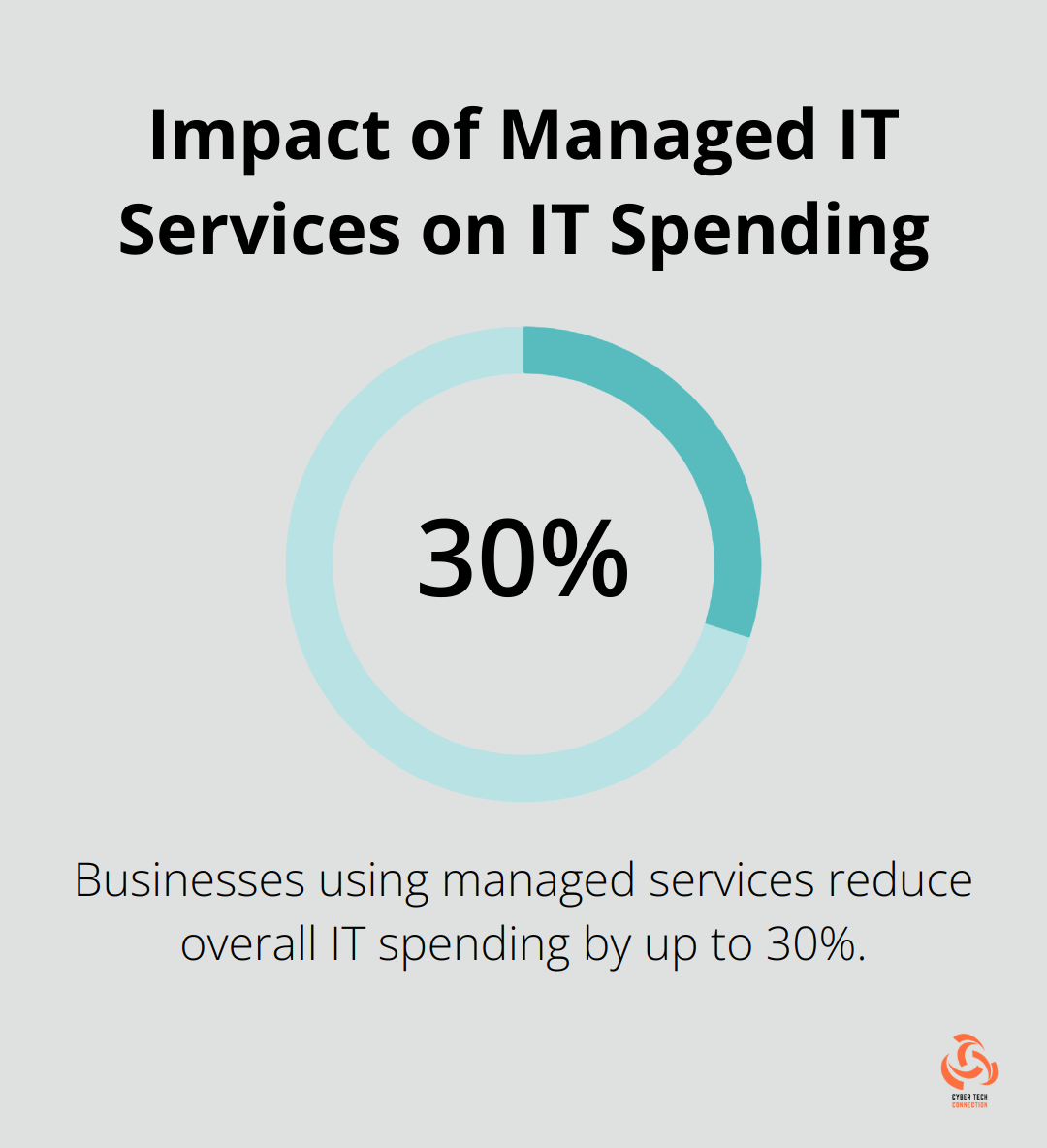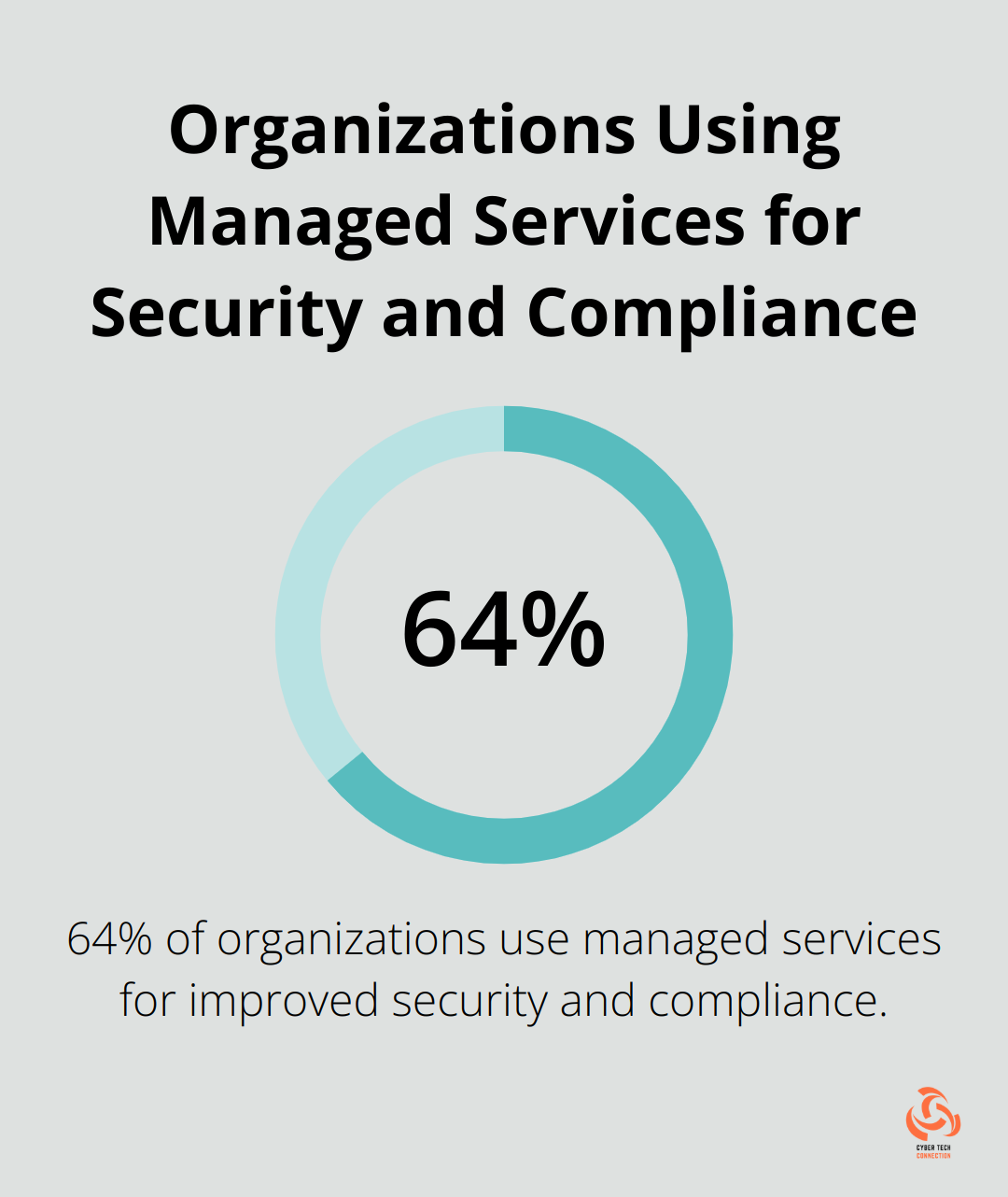The benefits of managed IT services include cost savings, enhanced security, and improved productivity. This blog post will explore these key advantages and show you how they can positively impact your organization.
How Managed IT Services Slash Costs
Dramatic Reduction in Operational Expenses
Managed IT services offer a powerful way to cut costs and improve financial planning for organizations. The most immediate benefit is the significant reduction in operational expenses. Research from CompTIA highlights that businesses using managed services reduce overall IT spending by up to 30% while enhancing service quality. This saving stems from the elimination of a full-time in-house IT team, reduced hardware purchases, and minimized unexpected repair costs.

Transition from Capital to Operational Expenses
Managed IT services enable organizations to shift their IT spending from capital expenses (CapEx) to operational expenses (OpEx). This transition has profound implications for financial flexibility. Instead of large, upfront investments in hardware and software, businesses can spread costs over time. According to Deloitte, manufacturers are prioritizing targeted investments in their digital and data foundation to boost innovation and tackle ongoing skills gap and supply chain challenges.
Budget Predictability with Fixed Monthly Fees
One of the most appreciated aspects of managed IT services is the predictability it brings to budgeting. Surprise IT bills and unexpected technology crises become a thing of the past. Most managed service providers offer fixed monthly fees based on the services you need. This model allows for more accurate financial forecasting and helps prevent budget overruns.
A survey by Spiceworks revealed that 56% of IT decision-makers cited predictable costs as a primary reason for adopting managed services. This predictability is especially valuable for small and medium-sized businesses (where cash flow management is critical).
Cost-Effective Scalability
Managed IT services provide a cost-effective way to scale your IT infrastructure. As your business grows, you can easily add new services or increase capacity without the hefty price tag of purchasing new hardware or hiring additional staff. This scalability ensures that your IT costs grow in proportion to your business, maintaining efficiency as you expand.
While cost reduction is a significant advantage of managed IT services, it’s not the only benefit. Organizations also gain enhanced security and compliance measures, which are essential in today’s digital landscape. Let’s explore how managed IT services bolster your organization’s defenses against cyber threats and help maintain regulatory compliance.
How Managed IT Enhances Security and Compliance
Proactive Threat Detection and Prevention
In today’s digital landscape, cybersecurity threats evolve at an alarming rate. Organizations need robust security measures to protect their valuable data. Managed IT services employ advanced threat detection systems that utilize artificial intelligence and ML algorithms to predict, detect, and respond to cyber threats. These systems continuously monitor network traffic for suspicious activities. A report by Accenture reveals that 68% of business leaders feel their cybersecurity risks are increasing. Managed IT services help mitigate these risks through real-time monitoring and rapid response to potential threats.
Continuous Security Updates and Patch Management
Maintaining a secure IT environment requires keeping all systems and software up-to-date. Managed IT services providers handle this task efficiently, ensuring prompt application of all security patches and updates. This proactive approach significantly reduces the risk of exploitation through known vulnerabilities. A study found that 60% of breaches in 2019 involved unpatched vulnerabilities, highlighting the importance of timely updates.
Regulatory Compliance Assistance
Navigating the complex landscape of regulatory compliance challenges organizations, especially those operating in highly regulated industries. Managed IT services providers possess extensive knowledge of various compliance standards (such as GDPR, HIPAA, and PCI DSS). They help organizations implement necessary controls, conduct regular audits, and maintain proper documentation to ensure compliance.
Comprehensive Data Protection
Managed IT services offer robust data protection measures to safeguard sensitive information. These measures include encryption, access controls, and regular backups. By implementing these strategies, organizations can protect their data from both external threats and internal mishaps.
Security Awareness Training
Many security breaches result from human error. Managed IT services often include security awareness training programs for employees. These programs educate staff about common cybersecurity threats, best practices for data protection, and how to identify and report potential security incidents.
A survey by CompTIA revealed that 64% of organizations that use managed services do so for improved security and compliance. This statistic underscores the critical role that managed IT services play in helping organizations meet their security and compliance obligations.

While enhanced security and compliance are significant benefits of managed IT services, they also contribute to improved productivity and allow organizations to focus on their core business activities. Let’s explore how managed IT services can boost efficiency and streamline operations in the next section.
How Managed IT Boosts Productivity
Managed IT services significantly enhance organizational productivity. They minimize downtime, provide access to specialized expertise, and free up internal resources. This shift allows businesses to focus on their core competencies and strategic initiatives.
Proactive Maintenance Reduces Downtime
Proactive maintenance reduces unexpected downtimes by helping to identify potential issues before they lead to equipment failure. Managed service providers (MSPs) continuously monitor systems and address potential issues before they escalate. This approach dramatically reduces downtime. MSPs use advanced monitoring tools to detect and resolve issues quickly, often before users notice a problem.
An MSP might detect early signs of hard drive failure on a critical server and replace it during off-hours (preventing a potential system crash during peak business hours). This proactive approach saves time and prevents potential data loss and productivity disruptions.
Specialized IT Expertise at Your Fingertips
Managed IT services provide organizations with access to a diverse pool of IT specialists. Instead of relying on a small in-house team with limited expertise, businesses can tap into a broad range of skills and knowledge. This access to specialized expertise proves particularly valuable for small and medium-sized businesses that might not have the resources to maintain a large IT department.
A survey by CompTIA found insights about IT industry trends and careers in IT. This trend highlights the value organizations place on accessing specialized IT skills through managed services.

Focus on Core Business Functions
The most significant productivity boost comes from freeing up internal resources to focus on core business functions. When organizations outsource IT management, employees can dedicate their time and energy to tasks that directly contribute to the organization’s primary objectives and growth.
Round-the-Clock Support
Managed IT services often provide 24/7 support, ensuring that technical issues can be addressed at any time (even outside of regular business hours). This round-the-clock availability means that employees can start their workday without facing IT-related delays or disruptions.
Streamlined Vendor Management
MSPs simplify vendor management by acting as a single point of contact for all IT-related issues. This approach eliminates the need for businesses to juggle multiple vendors and contracts, saving time and reducing administrative overhead.
Final Thoughts
The benefits of managed IT services extend far beyond cost savings and enhanced security. Organizations gain access to cutting-edge technology and expertise while freeing up internal resources to focus on core competencies. This shift in focus leads to increased innovation, improved customer service, and business growth.
Choosing the right managed service provider proves essential to reap the full benefits of managed IT services. Organizations should seek providers with a proven track record, industry-specific expertise, and a commitment to ongoing innovation.
At CTC, we offer a comprehensive range of services designed to meet diverse business needs. Our solutions (including mobile phone defense, endpoint management, and cloud backup) keep your network secure, up-to-date, and optimized for peak performance. We invite you to explore how our managed IT services can transform your organization’s technology infrastructure.

